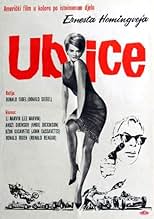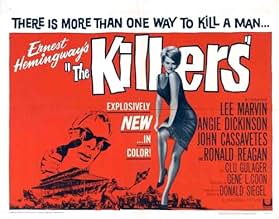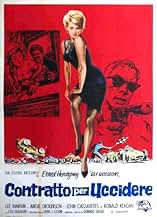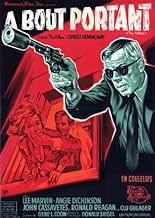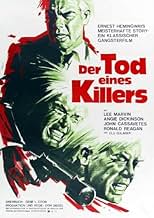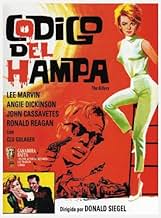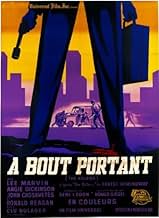IMDb RATING
7.0/10
10K
YOUR RATING
Surprised that their contract victim didn't try to run away from them, two professional hit men try to find out who hired them and why.Surprised that their contract victim didn't try to run away from them, two professional hit men try to find out who hired them and why.Surprised that their contract victim didn't try to run away from them, two professional hit men try to find out who hired them and why.
- Won 1 BAFTA Award
- 1 win & 1 nomination total
Irvin Mosley Jr.
- Mail Truck Guard
- (as Irvin Mosley)
- Director
- Writers
- All cast & crew
- Production, box office & more at IMDbPro
Featured reviews
This remake of the classic film with the same name (1946) by Robert Siodmak deals with two hired killers (Lee Marvin , Clu Gulager in similar role to William Conrad and Charles McGraw) who murder a man (John Cassavetes replacing Burt Lancaster) at a blind school . The cold-bloody assassins look into his past and by means flashbacks , attempting to solve leads as to why their victim calmly waits for his death and find tracks to a 100.000 dollars robbery . The gunmen discovering his involvement with crime boss (Ronald Reagan , alike role Alfred Dekkker ) and the gangster's moll (Angie Dickinson in the character of Ava Gardner).
This noir film packs action , thrills, suspense, tension , thundering drama and a mighty punch in some exciting scenes . It's loosely based very vaguely on a short story by Ernest Hemingway and originally pretended for television but exhibited to the cinemas due a its lots of violence . This thrilling story with intricate argument plenty of turns and twists , revolves around two assassins revealing surprise after surprise . Noteworthy portrayals come from menacing Ronald Reagan as a racketeer in his last movie, and of course Lee Marvin and Clu Gulager give towering performances as the gunfighters . There's also a magnificent action from John Cassavetes in the pivotal role and Angie Dickinson as gorgeous Femme Fatale and shooting to stardom in one of his first films . Atmospheric musical score by John Williams , subsequently famous as composer of Steven Spielberg films . Rating : Better than average . It's a good film that ensures the nervous intrigue never lets up from the first moment and realized in efficient style by Donald Siegel , then at the peak of his Hollywood career and future author of Charly Varrick, Coogan's bluff and Dirty Harry and sequels. Well worth watching .
This noir film packs action , thrills, suspense, tension , thundering drama and a mighty punch in some exciting scenes . It's loosely based very vaguely on a short story by Ernest Hemingway and originally pretended for television but exhibited to the cinemas due a its lots of violence . This thrilling story with intricate argument plenty of turns and twists , revolves around two assassins revealing surprise after surprise . Noteworthy portrayals come from menacing Ronald Reagan as a racketeer in his last movie, and of course Lee Marvin and Clu Gulager give towering performances as the gunfighters . There's also a magnificent action from John Cassavetes in the pivotal role and Angie Dickinson as gorgeous Femme Fatale and shooting to stardom in one of his first films . Atmospheric musical score by John Williams , subsequently famous as composer of Steven Spielberg films . Rating : Better than average . It's a good film that ensures the nervous intrigue never lets up from the first moment and realized in efficient style by Donald Siegel , then at the peak of his Hollywood career and future author of Charly Varrick, Coogan's bluff and Dirty Harry and sequels. Well worth watching .
Don Siegel's 'The Killers' is a diamond in the rough! Initially filmed for television, its technical limitations are easily overlooked as they are more than compensated for by the drive of the no-nonsense narrative, and the high standards of the acting. Caught somewhere between Kubrick's 'The Killing' and Boorman's 'Point Blank', it may not be as flamboyantly impressive as either, but it is just as memorable in its own low key way.
Quentin Tarantino has admitted that the structure of 'The Killing' has influenced him, but after watching 'The Killers', one must question whether this movie is also high on his list. Especially as the cooler-than-thou hit-men played by Lee Marvin and Clu Gulager almost anticipate Travolta and Jackson's similarly quirky ones in 'Pulp Fiction' thirty years later. Just like Vincent and Jules, Charlie and Lee are eccentric and likable when "off duty" and brutal sociopaths when on. Lee Marvin is one of Hollywood's legendary screen tough guys, and his performance here is as good as any he ever did, but the real stand out for me is Clu Gulager's health nut contract killer. He just about steals every scene he is in. Up to this point he was mainly known as a Western TV star. Why this role didn't launch him into a Bruce Dern/Harry Dean Stanton/Dick Miller style career baffles me. Instead he was mainly consigned to the "made for TV" wasteland, and never got the breaks his talent deserved.
Marvin and Gulager's star turns are backed up by strong supporting performances from John Cassavetes, as their enigmatic "job", Angie Dickinson, a double-crossing femme fatale, and Ronald Reagan in a surprising turn as a nasty gangster. Also keep an eye out for a dialogue-free cameo by a very young looking Seymour Cassel!
'The Killers' looks better and better as the years go by. Not without flaws, sure, and calling it a masterpiece would be overkill, but it's a movie that was ahead of it's time in many ways, and it can't help but impress discerning fans of 50s/60s b-grade crime movies, film noir, or Sam Fuller.
Quentin Tarantino has admitted that the structure of 'The Killing' has influenced him, but after watching 'The Killers', one must question whether this movie is also high on his list. Especially as the cooler-than-thou hit-men played by Lee Marvin and Clu Gulager almost anticipate Travolta and Jackson's similarly quirky ones in 'Pulp Fiction' thirty years later. Just like Vincent and Jules, Charlie and Lee are eccentric and likable when "off duty" and brutal sociopaths when on. Lee Marvin is one of Hollywood's legendary screen tough guys, and his performance here is as good as any he ever did, but the real stand out for me is Clu Gulager's health nut contract killer. He just about steals every scene he is in. Up to this point he was mainly known as a Western TV star. Why this role didn't launch him into a Bruce Dern/Harry Dean Stanton/Dick Miller style career baffles me. Instead he was mainly consigned to the "made for TV" wasteland, and never got the breaks his talent deserved.
Marvin and Gulager's star turns are backed up by strong supporting performances from John Cassavetes, as their enigmatic "job", Angie Dickinson, a double-crossing femme fatale, and Ronald Reagan in a surprising turn as a nasty gangster. Also keep an eye out for a dialogue-free cameo by a very young looking Seymour Cassel!
'The Killers' looks better and better as the years go by. Not without flaws, sure, and calling it a masterpiece would be overkill, but it's a movie that was ahead of it's time in many ways, and it can't help but impress discerning fans of 50s/60s b-grade crime movies, film noir, or Sam Fuller.
Under the title Ernest Hemingway's The Killers, Don Siegel's 1964 movie shows no more fidelity to the short story from which it takes its name and a fraction of its plot than Robert Siodmak's 1946 masterpiece, The Killers. And though it borrowed from the earlier movie its flashback structure (substantially simplified) and much of the backstory written for it, it's not quite a remake, either: the changes strike too deep.
A pair of contract hit-men track down a victim who seems ready, almost eager, to die. The killers this time around are Lee Marvin and Clu Gallagher, whose cozy arrangements suggest something of Fante and Mingo in The Big Combo. The first big shift from its 1946 predecessor is that Marvin's curiosity, not an insurance investigator's, sets the plot in motion, by his delving into the target's past and the whereabouts of a million dollars from a heist years before (in fact, he becomes the principal character). The second is a racheted-up level of violence: The movie opens with the pair tracking down their prey in a school for the blind, whose residents they ruthlessly terrorize during their hunt. And the level stays high.
John Cassavettes plays the victim, a former race-car driver fallen on hard times since a bad smash-up. Through the reminiscences of old buddy Claude Akins and past associate Norman Fell, we relive his racing career to an extent that stretches of the movie look like outtakes from Grand Prix. In those glory days he crossed tracks with the femme fatale of the piece, Angie Dickinson (in her rat-pack, late-Camelot salad days herself). After his car crash and their break-up, she lures him off the primrose path to serve as driver during a mail-truck robbery.
But Dickinson's heart belongs to daddy daddy in this instance being Ronald Reagan as a heavy. This marks his last film role. For a while it was chic to dismiss Reagan as a lousy actor, but he was always compentent enough. The puzzle is that the undeniable charisma that helped garner him the governorship of California and the presidency of the United States never came through on the screen; he couldn't carry a picture. He has a nasty moment slapping Dickinson silly when her attention strays to Cassavettes, but Marvin redeems his top billing by stealing the movie.
Ernest Hemingway's The Killers remains a good example of how the complexities and suggestiveness of the noir cycle were to metamorphose into a faster, flatter, more literal and brutal style of moviemaking starting in the late 1950s. Don Siegel was in the forefront of this change, starting in period noirs (The Verdict) but reaching his apogee, so to speak, in Dirty Harry. He delivers the goods, pronto, in a plain brown wrapper.
A pair of contract hit-men track down a victim who seems ready, almost eager, to die. The killers this time around are Lee Marvin and Clu Gallagher, whose cozy arrangements suggest something of Fante and Mingo in The Big Combo. The first big shift from its 1946 predecessor is that Marvin's curiosity, not an insurance investigator's, sets the plot in motion, by his delving into the target's past and the whereabouts of a million dollars from a heist years before (in fact, he becomes the principal character). The second is a racheted-up level of violence: The movie opens with the pair tracking down their prey in a school for the blind, whose residents they ruthlessly terrorize during their hunt. And the level stays high.
John Cassavettes plays the victim, a former race-car driver fallen on hard times since a bad smash-up. Through the reminiscences of old buddy Claude Akins and past associate Norman Fell, we relive his racing career to an extent that stretches of the movie look like outtakes from Grand Prix. In those glory days he crossed tracks with the femme fatale of the piece, Angie Dickinson (in her rat-pack, late-Camelot salad days herself). After his car crash and their break-up, she lures him off the primrose path to serve as driver during a mail-truck robbery.
But Dickinson's heart belongs to daddy daddy in this instance being Ronald Reagan as a heavy. This marks his last film role. For a while it was chic to dismiss Reagan as a lousy actor, but he was always compentent enough. The puzzle is that the undeniable charisma that helped garner him the governorship of California and the presidency of the United States never came through on the screen; he couldn't carry a picture. He has a nasty moment slapping Dickinson silly when her attention strays to Cassavettes, but Marvin redeems his top billing by stealing the movie.
Ernest Hemingway's The Killers remains a good example of how the complexities and suggestiveness of the noir cycle were to metamorphose into a faster, flatter, more literal and brutal style of moviemaking starting in the late 1950s. Don Siegel was in the forefront of this change, starting in period noirs (The Verdict) but reaching his apogee, so to speak, in Dirty Harry. He delivers the goods, pronto, in a plain brown wrapper.
I haven't seen Robert Siodmark's 1946 original, but since it's generally accepted to be better than this version; I sure want to see it! Second best, this may be, but that's certainly not to say that this isn't an excellent flick. Lee Marvin steps into the role of a hit-man brilliantly, and his no-nonsense performance really makes the film. He is joined by Clu Gulager as his fellow hit-man and partner into an investigation that comes about through Marvin as he wonders why he was paid so much to kill a former race car driver, who also didn't run away when he had the chance. What follows is a tour de force of gangster pulp fiction as the two hit men pay little visits to the various players in the plot behind the assassination they were contracted to commit. The style of the movie is delicious, and watching these two men stroll around coolly in their expensive suits while interrogating their various victims is a treat indeed. Several modern films, Pulp Fiction most obviously, have taken a lot of influence from this flick and it's always good to know where that influence came from.
The central pairing of Lee Marvin and Clu Gulager is what made the film for me. The way that they populate their scenes is excellent, with one of them doing the talking and the other fiddling around in the background. The way that this is orchestrated gives away a very understated coolness, which the film is always keen to capitalise on. The pair's chemistry is more to do with the style and how they look together than how they interact with each other; and that is right on cue. The Killers also benefits from an excellent support cast, which includes the likes of Ronald Reagan, Angie Dickinson and John Cassavetes. This film can't be considered noir because it's in colour, but this is about as close as you can get to the style without actually being a part of it. The film that it was based on was film noir, and this remake has managed to retain the foundations, even if it has lost the dark picture. On the whole, The Killers is an excellent picture and while what some people say about it being second to the original may be withstanding; I say this is an excellent flick in it's own right.
The central pairing of Lee Marvin and Clu Gulager is what made the film for me. The way that they populate their scenes is excellent, with one of them doing the talking and the other fiddling around in the background. The way that this is orchestrated gives away a very understated coolness, which the film is always keen to capitalise on. The pair's chemistry is more to do with the style and how they look together than how they interact with each other; and that is right on cue. The Killers also benefits from an excellent support cast, which includes the likes of Ronald Reagan, Angie Dickinson and John Cassavetes. This film can't be considered noir because it's in colour, but this is about as close as you can get to the style without actually being a part of it. The film that it was based on was film noir, and this remake has managed to retain the foundations, even if it has lost the dark picture. On the whole, The Killers is an excellent picture and while what some people say about it being second to the original may be withstanding; I say this is an excellent flick in it's own right.
When two hitmen kill Johnny North, it sticks with them why he simply stood ready to die and didn't bother trying to run or fight them. They look into his past and find he was once a successful driver of racing cars until an accident left him unable to compete in the big leagues again. They trace his story looking for money he is alleged to have stolen but find a complex tale of lies and deception.
I have not seen the original film so I was free from the burden of comparison when I watched this and I was maybe the better for it as I hear good things about the original. This version was made for television but given a cinema release due to it's violent content (which is really nothing by today's standards). The plot is interestingly told as we already know the fate of North, the only question is how he came to it and what happened to the $1,000,000 he supposedly made off with. It unfolds well and ends with a typically gritty denouncement.
The tone of the film loses the dark black & white of the noir genre in favour of bright daylight and colourful sets with a gritty violent edge to everything. This works well and it stands up today due to recent returns to this type of film thanks to Pulp Fiction's success (and many others of course). Like I said it isn't shocking as it may once have been but it works well as a tough little thriller.
Lee Marvin is perfectly cast and he carries the main part of the modern telling of the film. Likewise Cassavetes is really good as North and you can actually see him change his character from the brash driver to a broken man by the end. Dickinson is a good femme fatale and does it in such a way that she doesn't wear it on her sleeve or have a badge that says `I'm a femme fatale' in a way that some have done it here you only get a sense of who she is towards the end of the film. Ronald Reagan is good in his last acting role before entering politics.
Overall this is an effective film. It lacks it's own sense of style but is tough and enjoyable and it's hard edge is still evident today even if the shock value of the violence has faded as the audience has become more and more used to seeing violence as a mainstay of cinema.
I have not seen the original film so I was free from the burden of comparison when I watched this and I was maybe the better for it as I hear good things about the original. This version was made for television but given a cinema release due to it's violent content (which is really nothing by today's standards). The plot is interestingly told as we already know the fate of North, the only question is how he came to it and what happened to the $1,000,000 he supposedly made off with. It unfolds well and ends with a typically gritty denouncement.
The tone of the film loses the dark black & white of the noir genre in favour of bright daylight and colourful sets with a gritty violent edge to everything. This works well and it stands up today due to recent returns to this type of film thanks to Pulp Fiction's success (and many others of course). Like I said it isn't shocking as it may once have been but it works well as a tough little thriller.
Lee Marvin is perfectly cast and he carries the main part of the modern telling of the film. Likewise Cassavetes is really good as North and you can actually see him change his character from the brash driver to a broken man by the end. Dickinson is a good femme fatale and does it in such a way that she doesn't wear it on her sleeve or have a badge that says `I'm a femme fatale' in a way that some have done it here you only get a sense of who she is towards the end of the film. Ronald Reagan is good in his last acting role before entering politics.
Overall this is an effective film. It lacks it's own sense of style but is tough and enjoyable and it's hard edge is still evident today even if the shock value of the violence has faded as the audience has become more and more used to seeing violence as a mainstay of cinema.
Did you know
- TriviaAccording to Don Siegel, it was the policy at "Universal" at the time to shoot the last scene of the film first. On that first day of filming, according to Siegel and Clu Gulager, Lee Marvin arrived late and had been drinking, but because he had no dialogue, the scenes were used as shot.
- GoofsAt the start of the race, Johnny presses the accelerator to the floorboard with his right foot. However, his left foot is nowhere near the clutch. In a manual transmission, the clutch would need to be released while simultaneously accelerating.
- Quotes
Charlie Strom: Lady, I don't have the time.
- Crazy creditsThe style of the film's credits reflects its original made-for-TV origins: in 1960s TV movies, Stars, Co-stars, and Featured Players were listed only in the opening credits, while supporting players were listed only in the closing credits.
- ConnectionsFeatured in Biography: Angie Dickinson: Tinseltown's Classiest Broad (1999)
- SoundtracksToo Little Time
Music by Henry Mancini
Lyrics by Don Raye
Sung by Nancy Wilson
[Johnny and Sheila dance to the song performed at the nightclub]
Details
Box office
- Budget
- $750,000 (estimated)
- Gross worldwide
- $9,261
- Runtime1 hour 33 minutes
- Color
- Aspect ratio
- 1.85 : 1
Contribute to this page
Suggest an edit or add missing content


